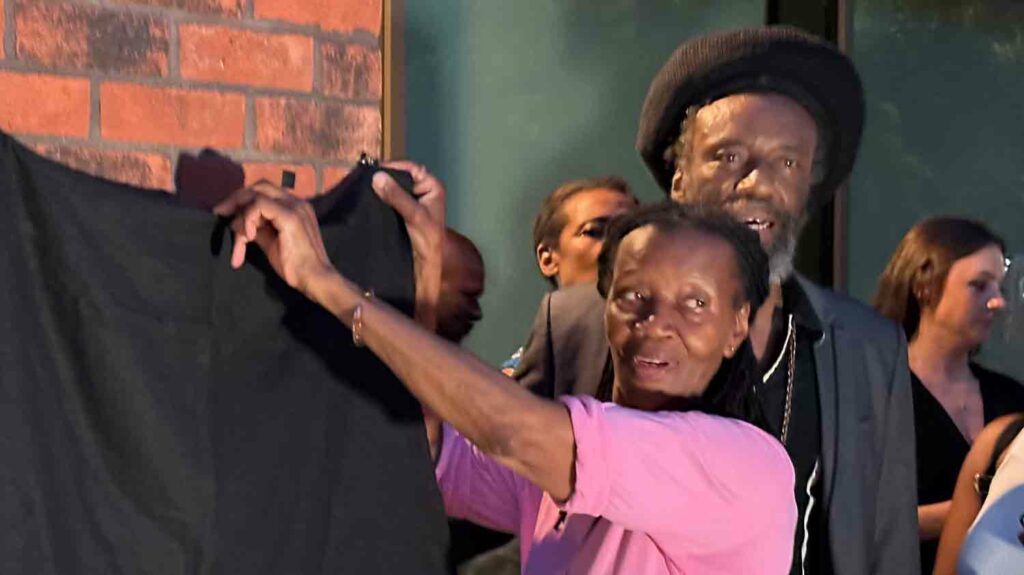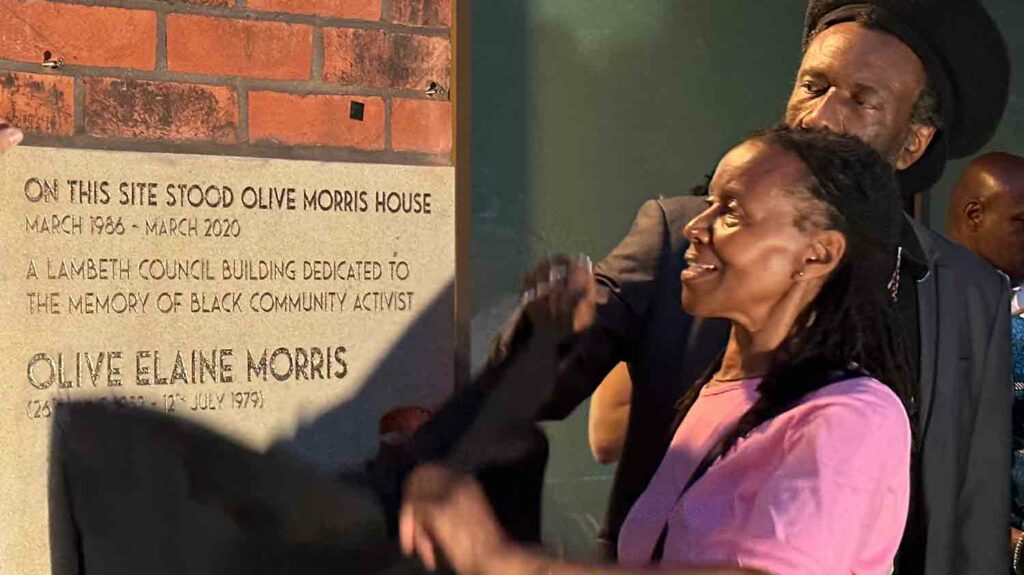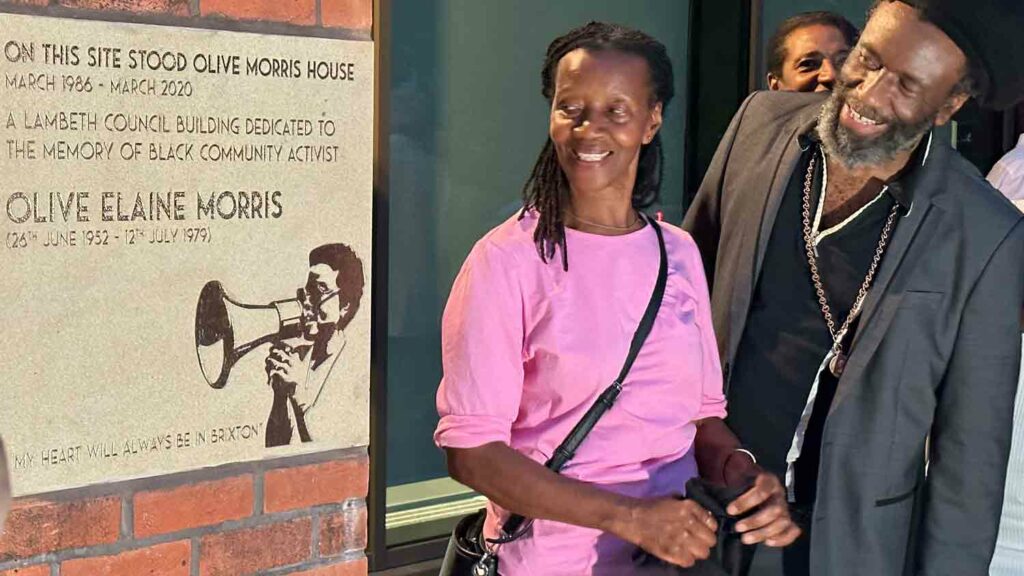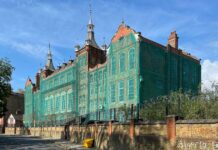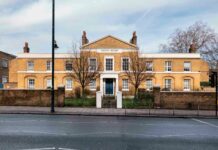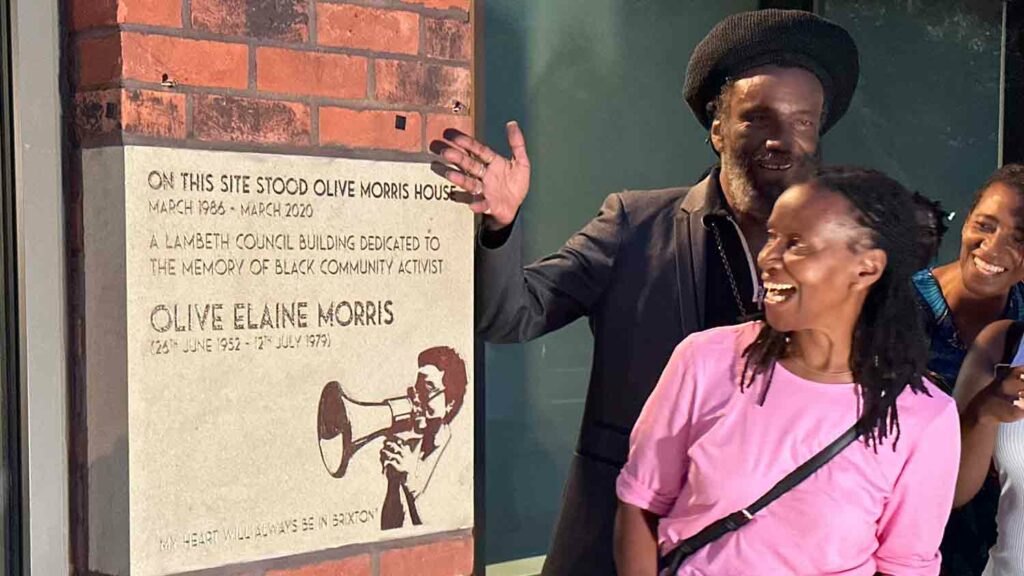
Olive Morris and Darcus Howe, two of Brixton’s most significant figures in recent history, were remembered at a ceremony in Lambeth archives’ new home on Brixton Hill last night (7 September).
An education room in the archives is named for Olive Morris, the activist, community leader and feminist. The housing development of which it is a part stands on the site of Olive Morris House – Lambeth council offices for decades before demolition.
A plaque on the building, remembering it as being on the site of Olive Morris House, was unveiled by members of her family.
Affordable housing in the new development in the site is named Darcus Howe Court, after the activist, broadcaster and Brixton resident who died in 2017.
Lambeth Archives manager Jon Newman said documents would start to be moved into the new archives in about three weeks time and that they would open to the public at the end of the year.
Mike Auger, managing director of Muse South, which developed the site as part of the council’s Your New Town Hall project, said consolidating the council’s operations, some into more efficient modern buildings, freed up space for new homes.
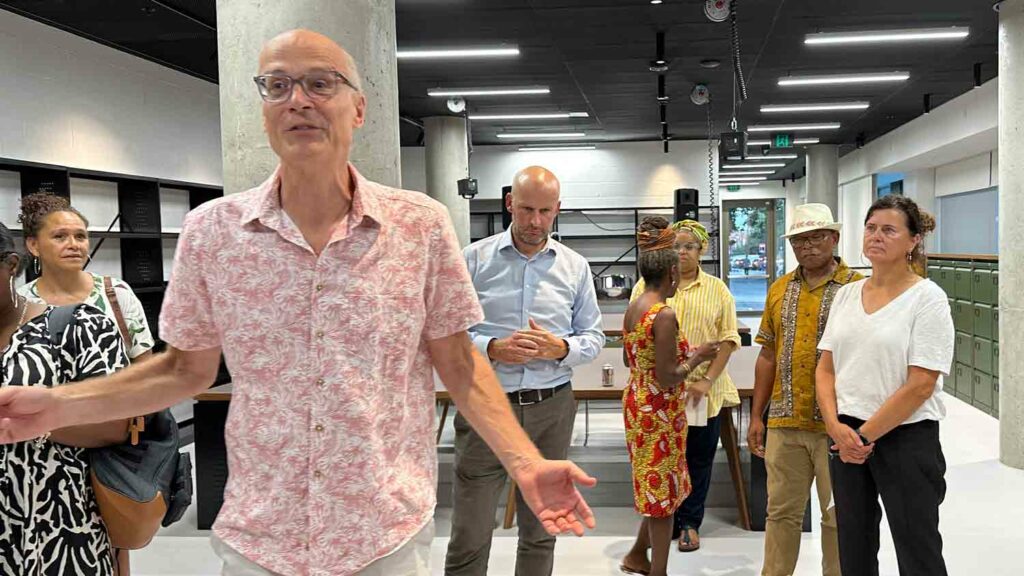
“We’re standing in part of that now, and we’re delighted that 40% of those homes have been delivered as affordable homes, working with our partners at Notting Hill Genesis housing association,” he said.
“It’s really important for us when we work in an area to get involved in its history and understand its sense of place, so it’s been a genuine pleasure to work with the community and the remembering Olive Morris Collective, to understand about Olive and the legacy that she left, and more recently with the Darcus Howe family.”
Claire Holland, leader of Lambeth council, said she was “absolutely thrilled to be joining this momentous occasion, which isn’t just celebrating the opening of the archives, but celebrating the lives of two people who have been so significant nationally.
“As I was growing up, I remember Darcus Howe being somebody who was spoken about in our kitchen by my parents. I remember the deep reverence with which, particularly my father, used to speak about Darcus Howe and the impact that he had in fighting racism and fighting for justice for all.
“We know that Lambeth has long been home to radicals and reformers, people like Olive and Darcus, who push at the boundaries of what is possible so that they can make a difference.
“For us here in Lambeth, it’s about recognising that our strength is in our diversity, because that is what gives voice to our communities and enables us to move forward and to fight for justice.
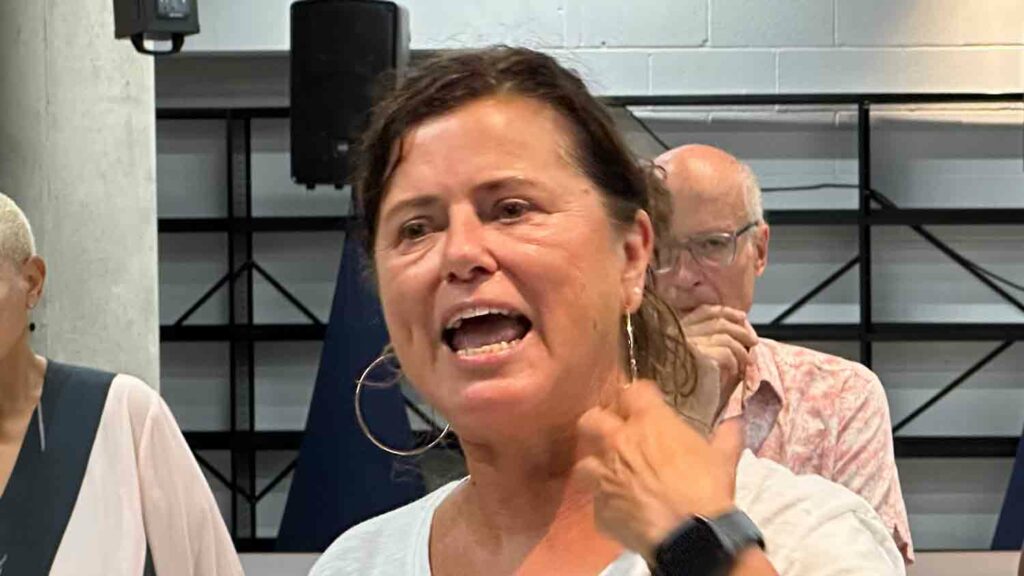
“I feel very strongly that we’re following in the footsteps of Olive and Darcus in building a borough of justice.
“That’s what we’re about as a council, tearing down deep-rooted inequality day by day, brick by brick, and making sure that we have a borough where everybody has the opportunity to thrive.”
Councillor Donatus Anyanwu, cabinet member for culture, said Olive Morris was born in 1952, and accomplished everything she did before she turned 30.
“I’m excited to be here at the new Lambeth archives, which host the Olive Morris Collection. The collection brings together photographs, oral history, and other things that celebrate the life of Olive.
He said the Remembering Olive Collective was formed in 2008 in Brixton with the aim of preserving the public memories of Olive and the organisations she was involved with.
Cllr Anyanwu paid tribute to Liz Obi, who was present at the event, who, he said, was absolutely crucial in making sure that those materials were not lost.
Liz Obi, a member of the Remembering Olive Collective, said later that it was happy to be able to join with the Darcus Howe Legacy Collective to celebrate the official opening of the Darcus Howe apartments and the unveiling of the memorial stone commemorating Olive Morris House as it provided the community with a unique opportunity to celebrate the lives of two Black activists.
“We are delighted with the memorial stone which commemorates Olive Morris House and which acknowledges Olive’s activism within the community. It is fitting also that Lambeth Archives, which hosts the Olive Morris Collection, will occupy the ground floor space in the new building and that they have named the reading room after her.”
Councillor Sonia Winifred said her career in Lambeth libraries started in 1981, “and even then there was discussion around the relocating of Lambeth archives … so it’s only taken 42 years, but we got here.”
She said she came on board with Leila, Darcus Howe’s widow, to ensure that his legacy was remembered in Lambeth.
She said Lambeth has a proud record of marking key figures, and throughout consultations on street names and buildings associated with the trans-Atlantic slave trade, “our objective was to utilise the figures and groups, that make Lambeth what it is today”.
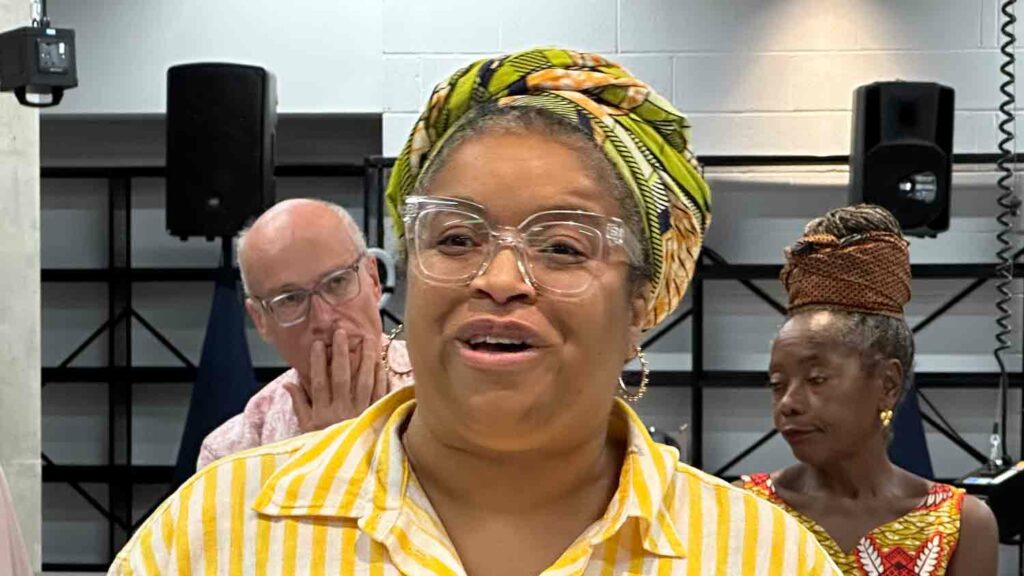
Kelly Foster, on behalf of the Remembering Olive Collective, (ROC) welcomed members of Olive’s family and comrades from the Brixton Black Women’s Group and the Black Panthers who were at the event.
Changes to Olive Morris House were the catalyst for ROC’s work over the past five years, she said.
“For us, it was the living legacy of Olive’s work and her struggle that it was important to preserve and to share.
“We did that through continuing the Olive Morris Awards, which are annual awards given to Black and Asian women doing work within their community.
“We also wanted to safeguard and provide some support for the Olive Morris papers that will be here at Lambeth archives.”
The Olive Morris collection are the most accessed collection at Lamber Archives, Kelly Foster said. “Since they were deposited around 15 years ago, they have really transformed how we think of Black history and women’s history in this country”.
Lettering that had been on Olive Morris House looking out onto Brixton Hill for the past 37 years had been installed in the Karibu Centre on Brixton’s Gresham Road with the help of Muse in the room that housed the first National Black Women’s Conference in 1979.
“We think this is really a fitting legacy for Olive,” Kelly Foster said.
It is also the room where Olive would have volunteered her time as a teenager working at the Gresham Youth Project.
The room was also where her memorial service was held and is now called Olive Morris Hall.
“We also wanted to install a memorial stone onto this new building that’s on this site,” said Kelly Foster.
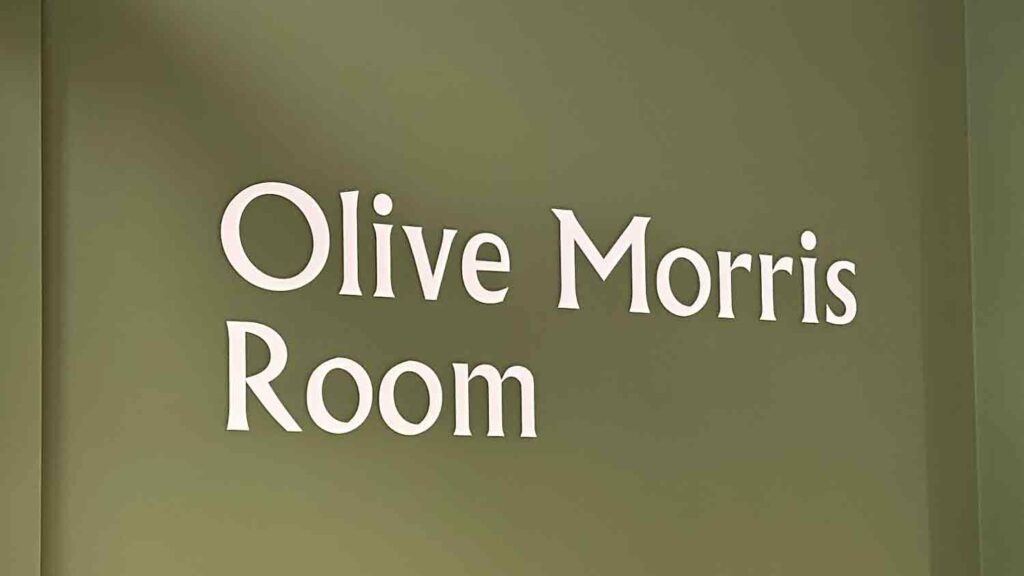
“You will see a stone that remembers Olive, but, really, a stone that remembers that here stood Olive Morris house.
“I was here as, I think, a six-year-old in 1986 when Olive Morris house was opened.”
“I remember it was Olive’s mum that unveiled the plaque that is now in the collection at Lambeth archives. But our memorial stone is to the fact that Olive Morris House used to stand here.
“For over 30 years, there was this building named after a young Black woman. It was unique at the time and perhaps unique even now, that there is a, a building named after a young Black woman from her community.”
Kelly Foster thanked Muse for supporting the installation of the lettering in the Karibu Centre and for installing the glass panel that used to be on the outside of Olive Morris house in the education room named after her inside the archives.
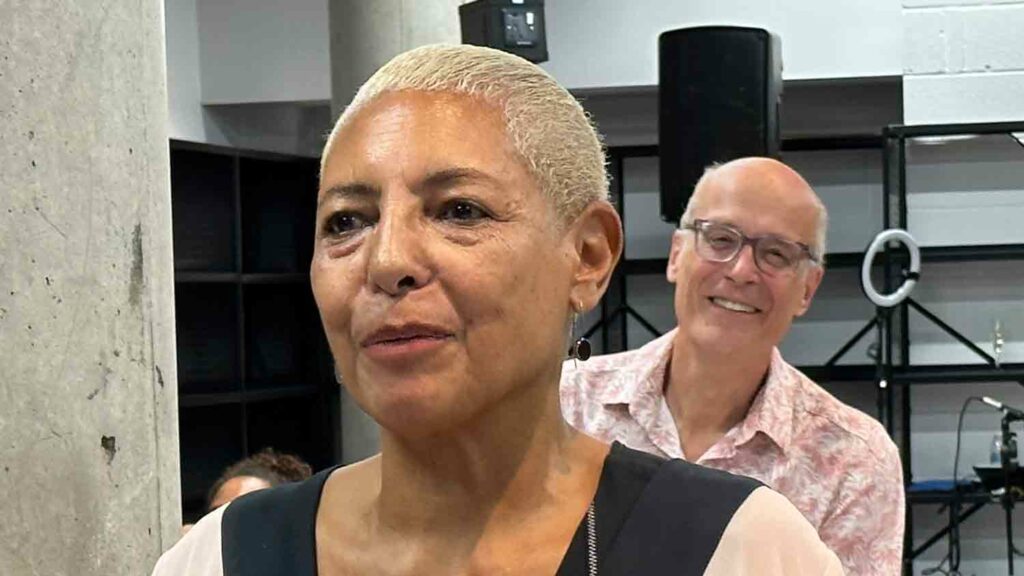
Leila Howe said Olive and Darcus met in the Black Panthers, but members of the Race Today magazine collective, that was based in Railton Road, remembered Olive for her assistance in finding space for it.
“Olive said to Darcus: ‘If your intention is to move into the Black community, if you come to Brixton, we can get some property’.
“I want you to have in your mind this image of myself, Darcus, and a young woman called Marie, walking down Mayall Road, and Olive saying to us: ‘You can have that one, you can get into that one, you can choose that one. No, that one you can’t get’.
“And when we chose what we wanted, Olive then showed us how to change the lock and go into the property.
“And then, when we wanted an office for Race Today, Olive said: ‘There’s some shopfronts down on Shakespeare Road’.
“So we followed Olive to Shakespeare Road and she said: ‘You can have that one, that one might be a bit difficult, not sure who the ownership is, but that’s Lambeth council’s – take that one.
“So we broke down the door and then we went into the, and squatted the Race Today offices and eventually squatted the building next door, which became 165 Railton Road.
“So their relationship was of service to us and, of course, eventually to the Black community in Britain and Brixton.”
Leila Howe continued: “We lived in a time, really an era, when we had to defy. It was an era of defiance and, in a way, Olive’ spirit really encapsulates that defiance.
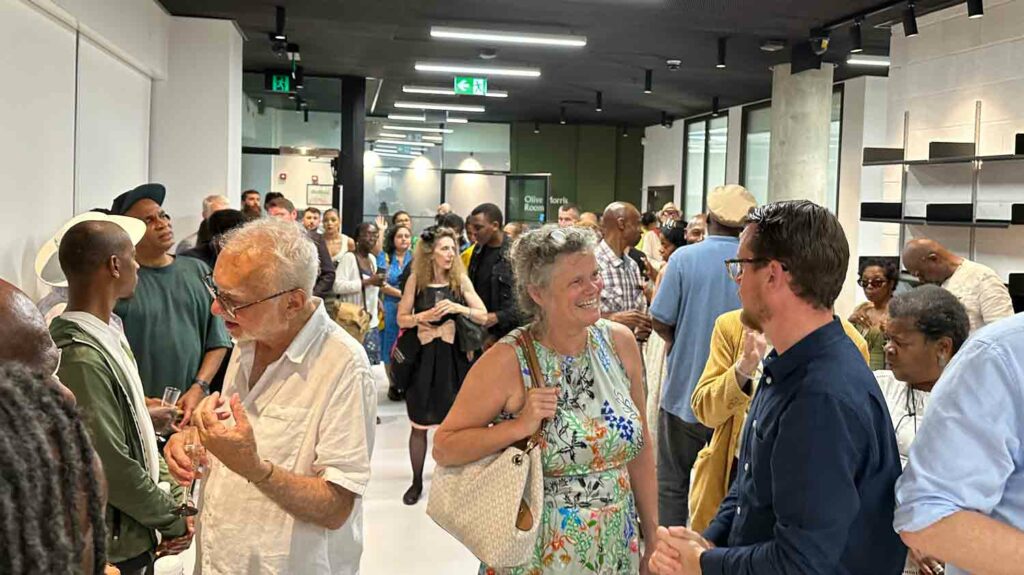
“But it was also an era when we believed there were possibilities. So we believed it was possible for us to take over buildings and produce a magazine.
“And we knew the power we had behind us and that Lambeth council would negotiate with us and say it was OK for us to say. I’m very aware that that’s not the case today.
“In a squat in Brixton we built an institution which captured the era in which we lived, an era of defiance, but an era of possibilities.
“One of the first things Darcus told us was that we were not part of the victim mythology … that we were poor Black people who couldn’t do anything.
“He absolutely imbued in us that we had to change our own destinies. And, believe you me, we believed we could.
“We produced a magazine. We organised events with Linton [Kwesi Johnson] who’s here … a lot of cultural things, poetry, readings, arts.
“We had international connections. You could walk into this squat in Brixton and meet all manner of really serious revolutionary figures of the time.
“What we had was an ideology that, if you wanted to make change, this was the way that you did it.
“Looking back – particularly in producing the issues of Race Today and developing the archive – I am absolutely amazed by what we achieved and how we achieved it.
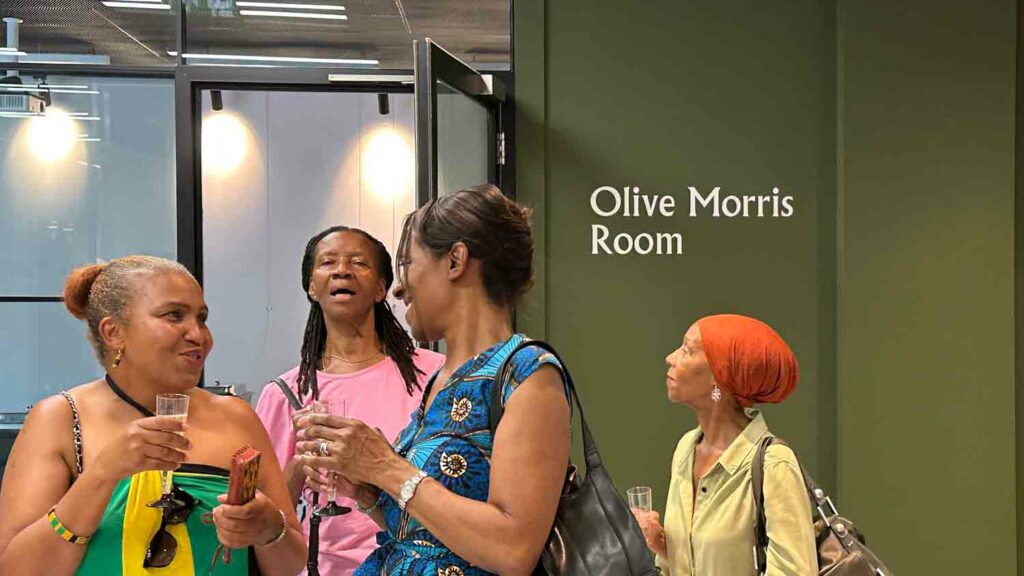
Leila Howe said she was walking in Brixton showing someone how it had changed, “when a young man approached us and said to her: ‘Mis’ Darcus, they thief Brixton from me’.
“A lot of the heritage of Brixton, of course, has now been erased,” she said. “The fact that someone could say that it’s been stolen really signifies something. We have to ensure that that legacy of Brixton that has been stolen remains, and that is really very strong in all the things that we do.”
She said that when she I heard about the building, “I thought, ‘Hmm … apartments, is this really a fitting tribute?’
“But the more I thought about it, and thought about Darcus’ personality, I thought people in a building fussing and fighting, growing up children, people living their lives, an organic kind of institution, not something that’s static, I think he would really have appreciated.
“I have visited the apartments and I want to say one of the things that’s impressed me – and I want to thank Muse and Lambeth council for this – is that these are not squalid council housing apartments.
“The footprint they have is the same as the commercial properties, and they’re beautifully made. And that’s really, really important because, at first, I thought: ah, we’re going go into some little, dodgy council place.
“Not at all. So thank you to Muse and for the way they thought about the buildings and the space and for the people who are going to live there.”
